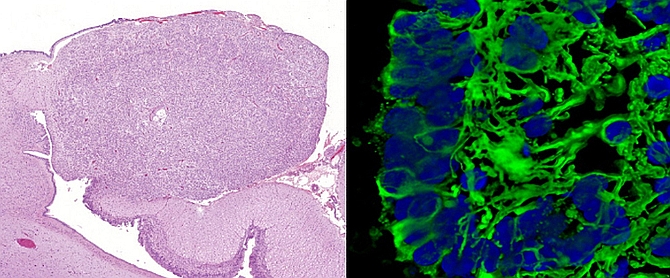
The research carried out in the Department of Histology and Embryology focuses primarily on the pineal gland and its most important hormone, melatonin. They concern the structure of the gland, the mechanisms that regulate its secretory activity and the content of melatonin in body fluids and tissues. The research subjects are mammals and birds, both domestic (pig, goat, sheep, fox, turkey, goose, duck) and wild animals (beaver, gull). Experiments are performed in vivo and in vitro, using monolayer culture techniques, superfusion culture, static organ culture. The simultaneous use of morphological techniques (histological, immunohistochemical and ultrastructural studies) and biochemical techniques (including the determination of the content of melatonin and its precursors, enzyme activity and changes in the concentration of neurotransmitters) enables the most comprehensive understanding of the phenomena studied.
The research on the pineal gland and melatonin mainly concerns:
the histological organisation and ultrastructure of the pineal gland in mammals and birds, the embryonic and postembryonic development of the pineal gland,
the influence of experimental factors on the ultrastructure of pinealocytes in mammals and birds,
morphological correlations of secretory processes in pinealocytes,
mechanisms for the regulation of melatonin secretion in the pineal gland of mammals,
mechanisms for the regulation of melatonin secretion in the pineal gland of birds,
metabolism of indoles associated with melatonin synthesis in the pineal glands of birds and mammals.
The research concerns in particular:
the influence of mycotoxins on the digestive tract of domestic pigs,
the influence of diet on the digestive tract of birds,
the effect of microcystin LR on fish liver.
The research concerns in particular:
the influence of blue light on the retina, the pathogenesis of changes in the eyeball caused by infection with the feline coronavirus (FCoV)
the circadian changes in the visual system.
Research project "Development of the pineal gland of the domestic goose during the embryonic period - structural and functional aspects" (project period: 01/07/2019-30/09/2021, project leader: Maria Hanuszewska.
Research project: "Determination of the effects of experimental Fusarium mycotoxicosis on selected diagnostic and morphological indicators of the digestive tract of pigs" (project period: 2010 - 2013; project leader: Prof. Maciej Gajęcki - Task: "Histological, immunohistochemical and ultrastructural studies of selected organs of the digestive tract (small intestine, large intestine and liver) of animals fed with feed containing zearalenone and deoxynivalenol.
Project entitled "Secretory processes and mechanisms of their regulation in the pineal glands of selected species of antlered birds" (project period: 2009 - 2013; project leader: Prof. Bogdan Lewczuk).
Project entitled "Pineal gland of the European beaver (Castor fiber) - morphological investigations" (project period: 2007 - 2009; project leader: Prof. Bogdan Lewczuk).
Project entitled "Species diversity of mechanisms regulating melatonin secretion in the mammalian pineal gland" (project period: 2003 - 2006; project leader: Prof. Bogdan Lewczuk, Ph.D.).
Project entitled "Morphological studies of the pineal gland of the domestic goat (Capra hircus) in selected periods of postnatal life" (project period: 2003 -2005; project leader: Prof. Barbara Przybylska-Gornowicz).
Project entitled "Morphology and physiology of the turkey pineal gland" (project period: 2001 - 2004; project leader: Prof. Barbara Przybylska-Gornowicz).
Project entitled "Mechanisms of sympathetic regulation of secretory processes in the pineal gland of the domestic pig - in vitro studies" (project period: 1999 - 2001; project leader: Prof. Bogdan Lewczuk).
Project entitled "Innervation of the pineal gland of the pig in the postnatal period - immunohistochemical studies (project period: 1997 - 1999"; project leader: Prof. Barbara Przybylska-Gornowicz, Ph.D.).
Project entitled "The influence of vasoactive intestinal peptide, neuropeptide Y and opioids on the secretory processes of pig pinealocytes" (project period: 1995 - 1997; project leader: Prof. Zygmunt Wyrzykowski).
Project entitled "Biogenesis and transformations of cytoplasmic granules and dense bodies of pig pinealocytes under the conditions of experimental melatonin administration" (project period: 1992 - 1995; project leader: Prof. Barbara Przybylska-Gornowicz).
Project entitled "Morphological aspects of the nervous regulation of secretory processes in the pineal gland of the pig" (project period: 1992 - 1994; project leader: Prof. Zygmunt Wyrzykowski)